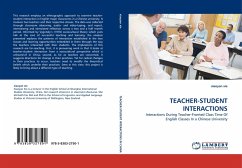The interpersonal interaction between teachers and
students comprises a large part of the classroom
learning environment and can greatly influence
student attitudes and achievement. Past research has
shown that a key factor in improving student
achievement and attitudes is to create learning
environments which emphasize characteristics that are
linked empirically with achievement and attitudes.
The Questionnaire on Teacher Interaction (QTI) was
used to investigate outcome-environment associations,
and to compare male and female students in terms of
their attitudes, classroom environment perceptions
and achievement. A modified form of the TOSRA
measured students attitudes to science. Students
quarterly (nine-week) science grade was used to
measure student achievement. A strong relationship
was found between student outcomes (attitudes and
achievement) and many of the eight QTI scales. Gender
differences in students perceptions of teacher
interpersonal behavior, attitudes towards science,
and science achievement were also revealed. In
general, relative to males, female students had more
positive perceptions of teacher interpersonal
behavior and higher academic achievement
students comprises a large part of the classroom
learning environment and can greatly influence
student attitudes and achievement. Past research has
shown that a key factor in improving student
achievement and attitudes is to create learning
environments which emphasize characteristics that are
linked empirically with achievement and attitudes.
The Questionnaire on Teacher Interaction (QTI) was
used to investigate outcome-environment associations,
and to compare male and female students in terms of
their attitudes, classroom environment perceptions
and achievement. A modified form of the TOSRA
measured students attitudes to science. Students
quarterly (nine-week) science grade was used to
measure student achievement. A strong relationship
was found between student outcomes (attitudes and
achievement) and many of the eight QTI scales. Gender
differences in students perceptions of teacher
interpersonal behavior, attitudes towards science,
and science achievement were also revealed. In
general, relative to males, female students had more
positive perceptions of teacher interpersonal
behavior and higher academic achievement








